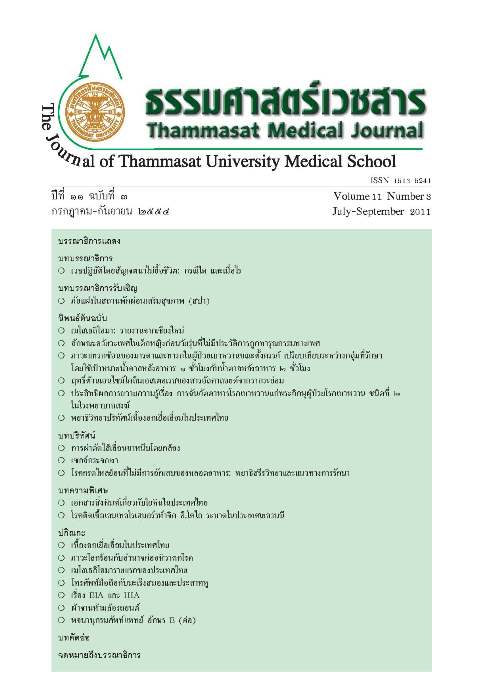The effectiveness of diabetic mellitus diet-counseling to monks with type 2 diabetes mellitus in Priest Hospital
Keywords:
พระภิกษุผู้ป่วยโรคเบาหวานระยะที่ 2, การถวานความรู้, โภชนบำบัดและการปฏิบัติตน, แบบทดวอบความรู้และพฤติกรรมการบริโภค, non-insulin diabetes mellitus (NIDDM) monk, counseling, dietary and appropriate behavior counseling, knowledge and behavior testAbstract
Diabetes Mellitus is a chronic disease which can cause many complications seriously affecting quality of life and longevity. Good management of blood sugar level reduces and avoids complications. Dietary management is one of very important factors to control blood sugar level. Since the difference regulations from people about proper time for a monk consumption, i.e. not eating before 6.00 AM and not after noon and taking food from the donor presenting to the hand or in the bowl, it may affect the control normal blood sugar level. In this study, we developed and evaluated the diabetic mellitus diet-counseling pattern in the type 2 diabetes with non-insulin dependent diabetes mellitus (NIDDM) monk out-patients of Priest Hospital. One hundred cases were randomly recruited. All were counseled in the first visit about disease, complication, dietary therapy and appropriate behavior. Blood sample collections for serum lipid levels and blood sugar levels determination and completion of the test regarding general history, knowledge and the behavioral frequency questionnaire were conducted two times (week 0 and week 6). At week 6, the level of FBS, TC, LDL-C, TG, body mass index (BMI), weight, systolic blood pressure, diastolic blood pressure and weight score of inappropriate behavior test decreased significantly (p < 0.05). In contrast, the score of knowledge test and the weight score of appropriate behavior test increase significantly (p < 0.05). The same manner occurr in HDL-C level without significant differences. The results suggested that dietary and appropriate behavior counseling were the method that the NIDDM monks understood and could do effectively. Diabetic mellitus diet-counseling to monks with type 2 diabetes mellitus was effective to attain the reduction of blood sugar levels and serum lipids, and sustainably improved eating behavior.
Key words: non-insulin diabetes mellitus (NIDDM) monk, counseling, dietary and appropriate behavior counseling, knowledge and behavior test



